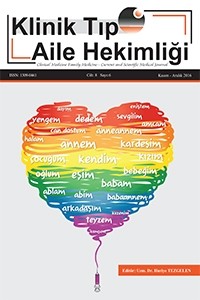Kronik Böbrek Hastalığı Olan Çocuklarda Beslenme Desteği
çocukluk çağı kronik böbrekhastalığı, beslenme, protein–enerji kaybı
Nutritional Support in Children with Chronic Kidney Disease
___
- Kaynaklar 1.Col M Kanitkar. Chronic Kidney Disease in Children: An Indi-an Perspective Med J Armed Forces India. 2009; 65(1) : 45-9. 2. Hussain F, Castledine C, van Schalkwyk D, Sinha MD, LewisM, Inward C. UK Renal Registry 12th Annual Report (Decem-ber 2009): chapter 15: clinical, haematological and bioche-mical parameters in patients receiving renal replacement the-rapy in paediatric centres in the UK in 2008: national and cen-trespecific analyses. Nephron Clin Pract 2010;115 (Suppl1):c289-308) 3. Mekahli D, Shaw V, Ledermann SE, Rees L. Long-term out-come of infants with severe chronic kidney disease. Clin J AmSoc Nephrol 2010;5(1):10-7. 4. Fine RN. Etiology and treatment of growth retardation in child-ren with chronic kidney disease and end-stage renal disease:a historical perspective. Pediatr Nephrol 2010;25(4):725- 32.) 5. Apostolou A,Printza N, Karagiozoglou-Lampoudi T,DotisJ,Papachristou F. Nutrition assessment of children with ad-vanced stages of chronic kidney disease-A single centerstudy.HIPPOKRATIA 2014, 18(3): 212-216 6. Wang XH, Mitch WE. Mechanisms of muscle wasting in chro-nic kidney disease. Nat Rev Nephrol. 2014 Sep;10(9):504-14 7. Rees L, Shaw V. Nutrition in children with CRF and on dialy-sis. Pediatr Nephrol 2007;22(10): 1689-702 8.Haffner D, Schaefer F, Nissel R, Wühl E, Tönshoff B, MehlsO. Effect of growth hormone treatment on the adult height ofchildren with chronic renal failure. German Study Group forGrowth Hormone Treatment in Chronic Renal Failure. N EnglJ Med 2000;343(13):923-30 9.Köksal G, Gökmen H. [Nutritional therapy in kidney disor-ders]. Köksal G, ed. Çocuk Hastalıklarında Beslenme Teda-visi. 1. Baskı. Ankara: Hatipoğlu Yayınları, 2000. p. 679-703
- ISSN: 1309-0461
- Başlangıç: 2009
- Yayıncı: Selen Medya Yayıncılık Tanıtım ve Organizasyon Hizmetleri
Aile Hekimliği Polikliniğinde Hipofizer Gigantizm Tanısı Konulan Bir Olgu
Aile Hekimliği Polikliniği'nde Renal Hücreli Karsinom Tanısı Koyulan Bir Olgu
Üniversitesi Öğrencilerinde Güneşten Korunma Bilinci (Toplumsal DuyarlılıkProjesi)
Türkiye’de Özçekim Yaralanma ve Ölümleri
Rekürrent Aftöz Stomatitli Olgularda Hemoglobin, Demir, Ferritin ve Vitamin B12 Düzeyleri
Kronik Böbrek Hastalığı Olan Çocuklarda Beslenme Desteği
